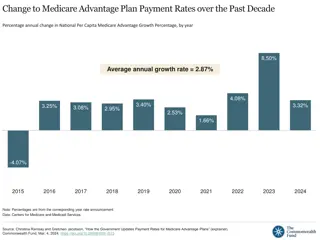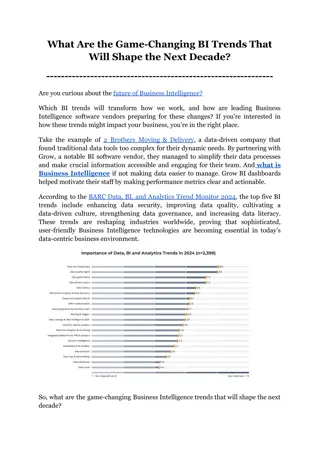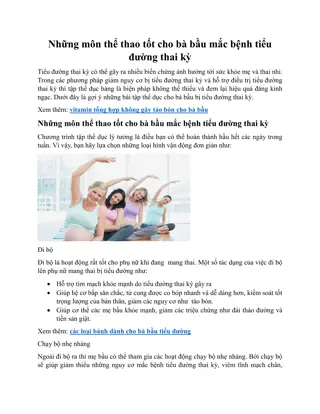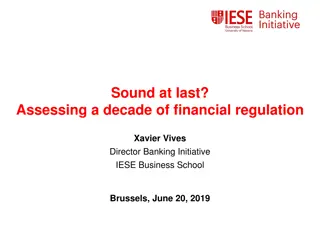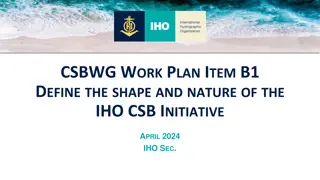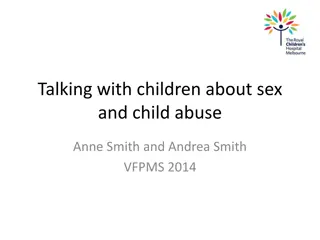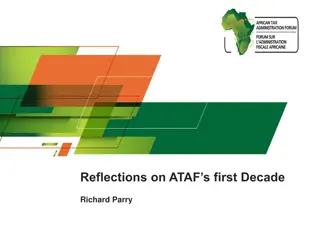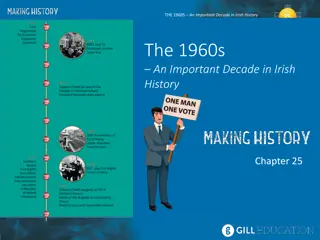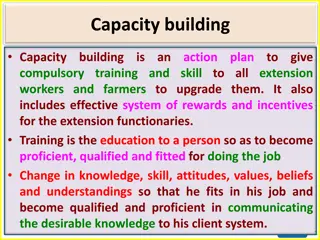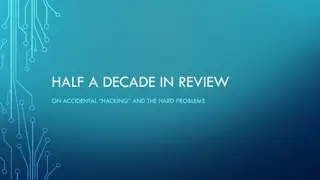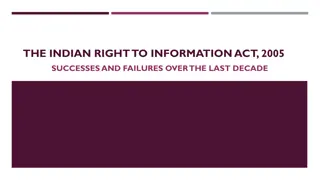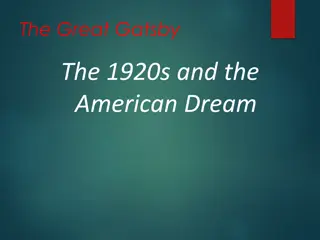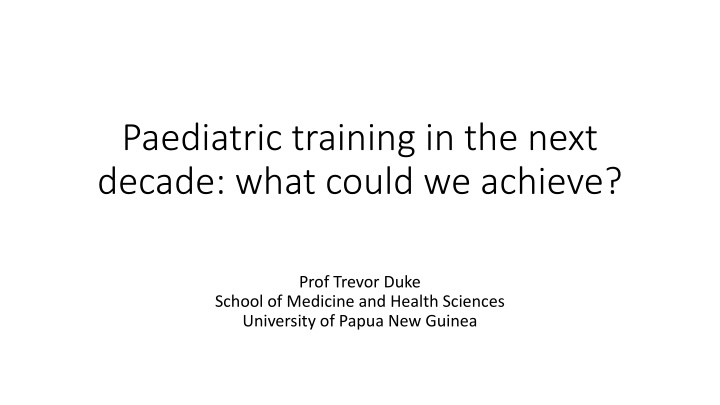
Advancements in Paediatric Training: Achieving Progress in the Next Decade
Explore the future potential of paediatric training and education, as presented by Prof. Trevor Duke from the University of Papua New Guinea. Topics include international benchmarking, challenges faced, and the evolving role of paediatricians worldwide. The discussion delves into the importance of quality learning opportunities, lifelong learning, and the impact of paediatricians on children's health. With a focus on improving the ratio of paediatricians to children, the narrative envisions a future with enhanced healthcare outcomes for young patients.
Download Presentation

Please find below an Image/Link to download the presentation.
The content on the website is provided AS IS for your information and personal use only. It may not be sold, licensed, or shared on other websites without obtaining consent from the author. If you encounter any issues during the download, it is possible that the publisher has removed the file from their server.
You are allowed to download the files provided on this website for personal or commercial use, subject to the condition that they are used lawfully. All files are the property of their respective owners.
The content on the website is provided AS IS for your information and personal use only. It may not be sold, licensed, or shared on other websites without obtaining consent from the author.
E N D
Presentation Transcript
Paediatric training in the next decade: what could we achieve? Prof Trevor Duke School of Medicine and Health Sciences University of Papua New Guinea
International benchmarking Numbers, content, quality Challenges Improving learning opportunities Supervisors and mentors Life-long learning Nurses and HEOs Paediatrician academics
Paediatricians around the world Low income 0.5 per 100,000 Low-middle income 6 per 100,000 Upper-middle income 30 per 100,000 High income 72 per 100,000 Age at transition of adolescents 12 3% 15 39% 18 82%
4.9 million children and adolescents <18 years of age 39 paediatricians in clinical practice (includes at least 7 in admin roles) 3 tertiary academics 1 per 125,000 children and adolescents (0.8 per 100,000) Manus, Enga, Jiwaka
Masters of Medicine II PNG 12 (4 MMed II exam in 2023) Solomon Islands 2 (1 MMed II exams in 2023) Current Paediatric Trainees n=27 Part 1 (2023) PNG 4 DCH (2023) PNG 8 Solomon Islands 1 Total - 27
2024-2030 We need at least 6 starting DCH every year to reach modest targets 3 paediatricians per province = 63 clinical paediatricians = 1.2 per 100,000
Not just about numbers changing epidemiology, so more complex curriculum 1. Acute infectious diseases 2. Chronic infectious conditions 3. Chronic non-communicable diseases: asthma, epilepsy, cerebral palsy, cancer, cardiac disease, kidney disease 4. Impacts of poverty, environment, social issues: malnutrition, child neglect, domestic violence, trauma and injuries 5. Adolescent health concerns including mental health, self-esteem, nutrition, substance use, sexual health, social media pressures 6. Neurodevelopment and mental health issues autism, effects of chronic diseases
Not just about clinical care General Paediatricians Acute care clinician Coordinator of chronic care Public child health programs Teacher and mentor Epidemiology and research Quality improvement and audit Liaison with other stakeholders in child health Life-long learner Subspecialty interests
Challenges Maintaining numbers, and diversity in subjects, and quality of training Every hospital should have at least one registrar in training enhances the quality of services bring energy and what they have learnt promotes an atmosphere of enquiry, curiosity, teaching we need to continue to inspire more RMOs to enter paediatric training and show them that we have a quality program.
Improved learning opportunities CME, run by Dr Toti Regular lectures Learning resources on-line Cardiology teaching by Dr Olita a and Dr Kilalang Oncology teaching by Dr Anga More teaching on adolescent health, social and community paediatrics, disability, child protection, basic echo / US Other skills they don t always teach us in medical school: communication skills, coping with death and loss, time-out, work-life balance, management
Challenges Easy for registrars to get lost, especially at transition points During the DCH Between the DCH and Part 1 Between Part 1 and when they come to Moresby for the final 2 years Understandable personal reasons Out of sight, out of mind Emotional challenges of paediatrics, family, or financial pressures Mentors and supervisors
Supervisors and mentors Tools for regular clinical assessment and feedback Identifying trainees that are falling behind Training and support for supervisors It helps supervisors to supervise if they are working towards something themselves (life-long learning)
Life-long learner Numerous ways to be a life-long learner Attendance at PMGH Grand Rounds CME sessions WhatsApp communication regarding patients Weekly paediatric teaching Starting a research project, or working towards an MD Attending a symposium or international conference (many of which are now online) Online courses Higher post-graduate degree
Higher post-graduate diplomas Cardiology Oncology Intensive care (general, open to paediatricians) 2 years working post-MMed as a General Paediatrician, with some experience in the field. At this stage there are no funded training jobs specifically linked with these diplomas, but they need to be working practically in the specialty to do the diploma. Clinical haematology / neonatology / other?
Higher post-graduate diplomas Not just a cardiologist or an oncologist , but someone who remains a generalist paediatrician (with the qualities I mentioned at the start) Narrow super-specialization in modern medicine results in: highly fragmented care errors (narrow focus bias) Specialist interest should not be constrained by whether there is a formal HPGD or not: new areas: ethics, palliative care, HIV medicine, rheumatology, community paediatrics
Academics in child health Opportunities for advancement Research training / PhD / MPH Teaching and education Clinical specialization Engagement Need to remain clinically involved
Paediatric nursing and HEO training in child health Child health will always rely on nurses, and given the complexity of child health now, we need more paediatric nurses The curriculum must keep pace with the changing trends in child and adolescent health, practical, independent practitioners Many hospitals have loyal HEOs who have worked in the paediatric ward for years, but there is no pathway to advancement we need a paediatrics course for HEOs
Summary Inspire our RMOs to do the DCH Contribute as provincial paediatricians to the training program you have an essential contribution to make as mentors and supervisors Become life-long learners



